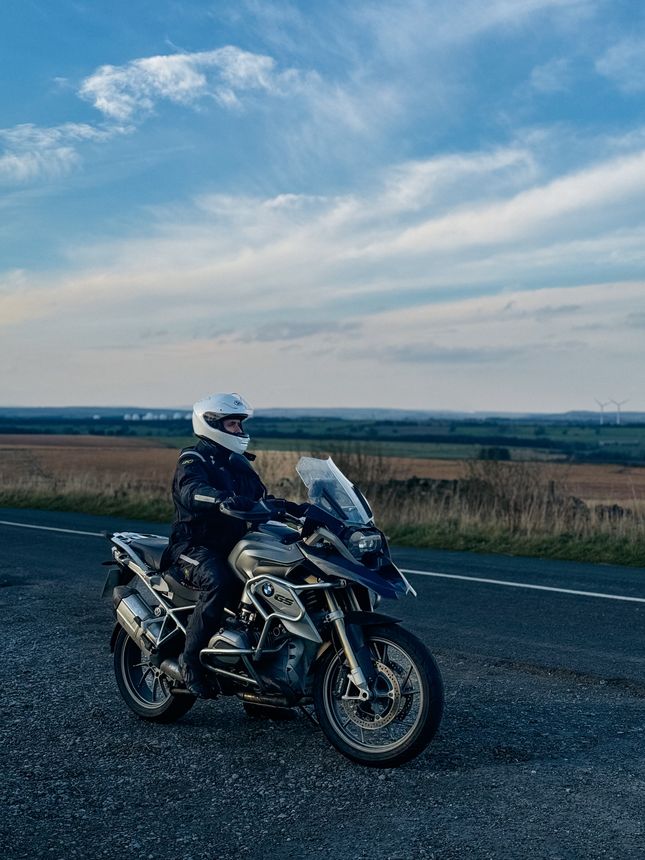Staying safe on your motorcycle: Tips on reducing risk on Britain’s roads
As a solicitor specialising in serious injury and fatal claims, I’ve seen first-hand the devastating consequences of motorcycle collisions.
Many of the bikers I represent have suffered life-changing injuries, including brain injury, spinal cord injury and amputation. Tragically, I also represent the loved ones of some who have lost their lives.
Despite this, to the surprise of many, I continue to ride my BMW 1200GS motorcycle. During my time with Irwin Mitchell in London, I would commute on it daily. Now based in our Leeds office, I instead enjoy rides out in the Yorkshire Dales and North York Moors.
I therefore fully understand the passion that comes with riding motorcycles, but also your vulnerability and the risks that come with riding on Britain’s roads.
Biker safety advice
That’s why I’ve teamed up with my colleague Dave Cruxton - one of Irwin Mitchell’s police co-ordinators and a former advanced police motorcyclist - to share practical advice that could help prevent future tragedies. Dave has also delivered BikeSafe training on behalf of the police, along with IAM RoadSmart advanced rider training and brings decades of road safety expertise to this conversation.
Many of our cases involving bikers are caused by other motorists failing to pay attention. I routinely see drivers saying things such as – “Sorry mate, I didn’t see you” or “They came out of nowhere”. Commonly riders are not to blame at all. Nevertheless, there are ways for bikers to do more to protect themselves, anticipating where crashes can and do occur.
Together, Dave and I have compiled ten safety tips for motorcyclists. Whilst the riding season may soon be over for some, others will persevere through the cold months ahead. These insights are not just for new riders—they’re reminders for all of us who ride, whatever the weather.
Ten safety tips every rider should know
- Ride Defensively: Assume other drivers have not seen you. Maintain a safe distance and anticipate hazards.
- Adapt to Weather and Road Conditions: Wet or icy roads reduce grip. Slow down and increase following distances.
- All The Gear All The Time: Helmets, gloves, boots, and abrasion-resistant clothing are vital should a crash happen. It can also keep you warm and dry when the weather turns, helping maintain your concentration.
- Be Visible to Others: Use lights, wear bright clothing, and avoid riding in vehicle’s blind spots.
- Ride with a Clear Mind: If you're feeling stressed, distracted, or emotionally overwhelmed, consider postponing your ride. Mental focus is just as important as physical skill.
- Respect Speed Limits: Excess speed reduces reaction times and increases crash severity.
- Never Ride Under the Influence: Alcohol and drugs impair judgment. Stay sober and alert.
- Take a Break: Fatigue also impairs judgment and awareness.
- Use Brakes Smoothly: Practise using both your front and rear brakes together to avoid skidding under heavy braking.
- Inspect Your Motorcycle Before Riding: Check tyres, brakes, lights, and fluid levels regularly.
Serious injury lawyer's expert insight
Motorcycling demands full attention. If your mind is elsewhere - whether due to stress, fatigue, or emotional strain - your ability to react quickly and safely is compromised. A clear head can be the difference between a safe ride and a serious crash.
Taking advanced training increases your safety enormously. Don’t just invest in your bike. Invest in yourself.”
Final thoughts
Motorcycle safety isn't just about gear and technique - it’s about mindset. As riders, we owe it to ourselves, our loved ones, and our fellow road users to stay sharp, stay visible, and stay educated.
If you or someone you know has been affected by a motorcycle collision, our team at Irwin Mitchell is here to help. Find out more about our expertise in supporting motorcyclists and families following a collision at our dedicated motorcycle claims section.

